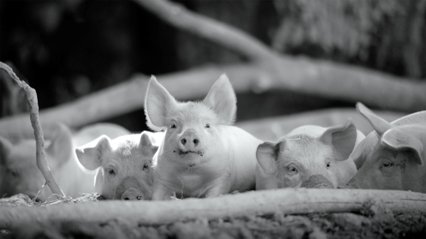 Victor Kossakovsky shows us the experience of farm animals without the mediation of human words and concepts, in a film that extends compassion to life other than our own.
Victor Kossakovsky shows us the experience of farm animals without the mediation of human words and concepts, in a film that extends compassion to life other than our own.
The amazing advancements in cinematic technology in recent decades include cameras and sound equipment that can give us sound and image close-up from a long distance, as well as small and portable devices for ground level shots. One of the benefits of these new tools is the ability to make films about animals that eliminate interference from the presence of humans to a remarkable degree. Nothing I’ve seen exemplifies this advantage better than Gunda, a film by Russian director Victor Kossakovsky, released in 2020.
Gunda is the name of a large and impressive looking sow with a litter of twelve piglets, that we see living in a farm environment. The movie doesn’t tell us that that’s her name, but I learned it from reading about the film later. In fact, there is no narration in Gunda, no explanatory text, no music, no language or voices, no human beings at all. For the entire film, at least before the end credits, we only observe Gunda and her litter, as well as some free range chickens and cows. The gorgeously crisp photography is in black and white. In my view, black and white more vividly conveys subjective states. Whether or not that was the reason for using it, black and white suits the film’s message perfectly.
In the long opening sequence, the mother pig sleeps, and gradually we see the piglets emerging from behind her in the doorway of her open pen. The process begins by which the little ones feed from their mother’s milk. There are enough nipples for all of them, but it takes time for each adorable baby to find one, as they crawl on top and between one another. We are at ground or eye level with them, as we are for most of the film, not looking down at them from a human point of view, but right in there among them. The time for animals is at a different pace than what we have accustomed ourselves to. The mother wakes up, shifts her body, helps the babies to access her as best she can, and it takes time, time for the experience of being an animal.
Later we observe chickens, released from a cage by an offscreen presence slowly emerging into a field with woods where they slowly and very carefully explore the terrain. They too, have the force of personality, the character of beings purposely seeking their needs. One of the chickens gets around on only one leg, and quite well, I must say. Later, Kossakovsky shows us a herd of cows. We look in their eyes, observe their interactions with one another, including helping to swat away flies with their tails, and they too display their personhood.
The Lakota speak of animals as people: for example, the “four-legged people” or the “winged people.” That’s what this film does as well. We are made to see these beings’ lives as sufficient and meaningful, apart from any consideration of how they could be of use to us. When we return to Gunda and her litter, the piglets have gotten bigger and more playful as she leads them around the yard. I said before that there are no humans. Towards the end, we do see a large farm vehicle drive up, but we don’t see the people driving it. The movie doesn’t show us animals being slaughtered or treated cruelly, and we don’t hear that either. Yet the film, and especially the ending, has an unforgettable impact. With pure visuals it makes the best case against eating animals I’ve ever seen. Gunda is a beautiful work that conveys to us, without any preaching, the absolute unity of life.

Josef von Sternberg’s 1928 silent movie depicting the life of the destitute on the New York waterfront, is one of the great American films....

Lionel Rogosin’s 1956 portrait of the Skid Row neighborhood in lower Manhattan was a startling new development in American cinema. On the Bowery is...

This film features real people playing themselves in a drama about a young rodeo hotshot whose career has been cut short by a head...